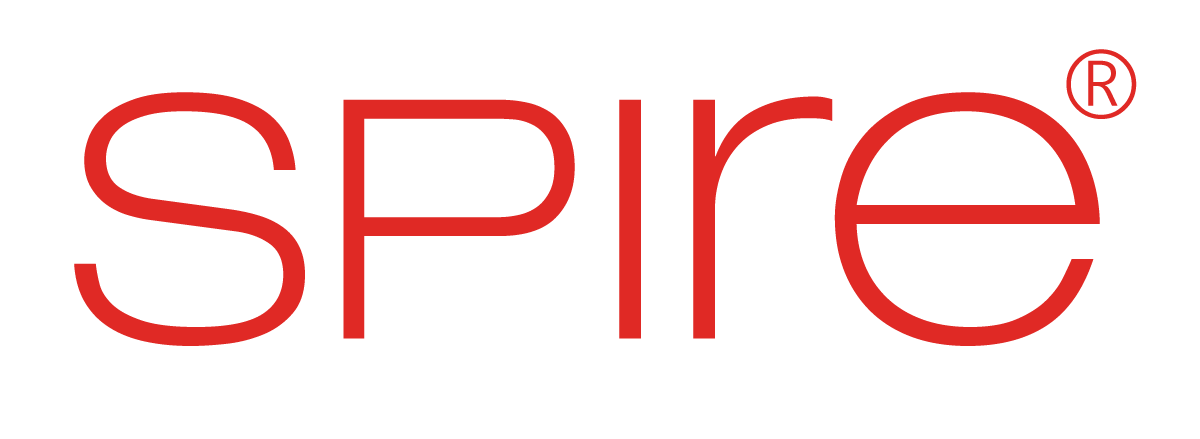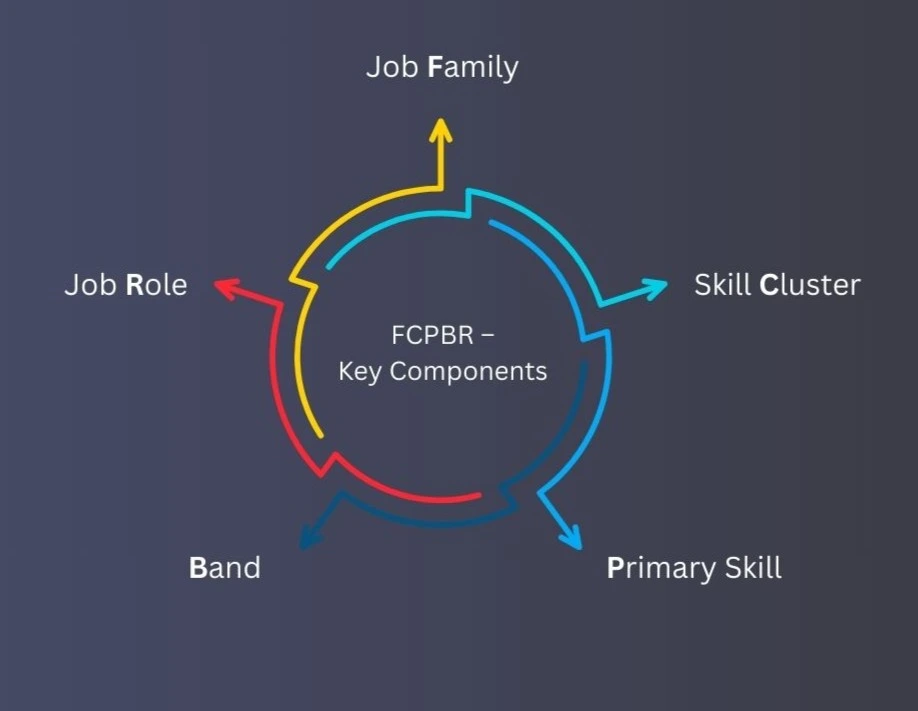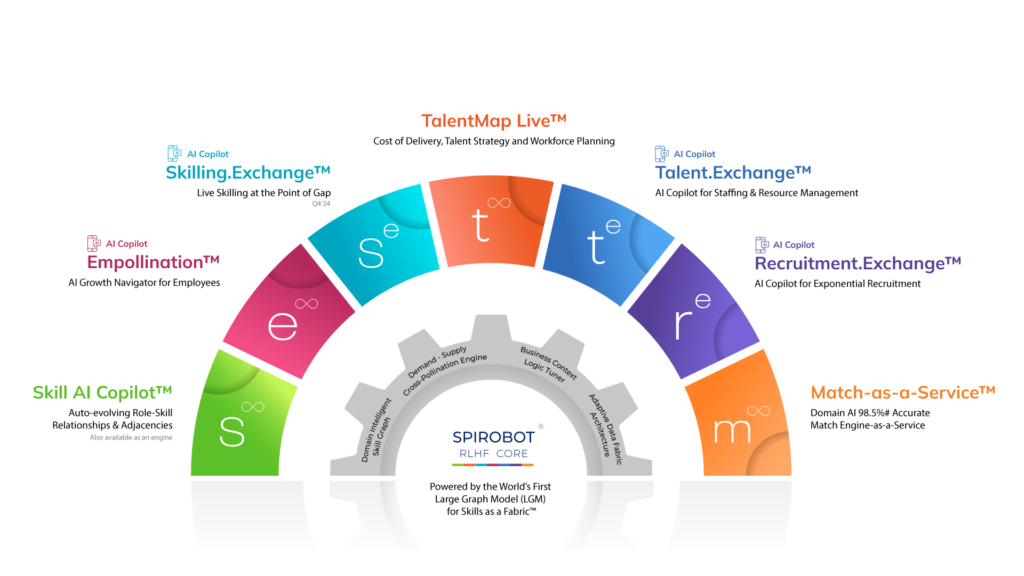The nature of work and the skills required to perform it are evolving at an unprecedented pace. Organizations that once relied on static role descriptions and fixed job competencies are now recognizing the limitations of these outdated approaches. The rapid evolution of skills required for modern roles means that a rigid, pre-defined job structure no longer meets the demands of businesses looking to remain competitive.
A skills-based workforce model ensures that employees are evaluated and developed based on their skills rather than their job titles. This shift allows businesses to create more agile talent structures, focusing on competencies that drive productivity and innovation. According to a recent study by the World Economic Forum, over 50% of all employees will require significant reskilling by 2025. The need for adaptable and continuously evolving workforce structures is more critical than ever.
To meet this demand, businesses must transition toward auto-evolving role-skill frameworks, AI-driven solutions that dynamically adjust role requirements based on shifting industry trends. These frameworks move beyond the traditional job hierarchy and allow for real-time skill tracking, automated role adjustments, and seamless workforce optimization.
The Need for a Skills-First Approach
Organizations today face a constant challenge: how to ensure that their workforce remains adaptable while aligning talent management with business goals. The traditional approach of static job descriptions and rigid role definitions is no longer sufficient to keep pace with evolving skills demands. A shift toward a skills-first approach is necessary to maximize organizational agility, retain top talent, and prepare for future workforce needs.
A well-structured skills framework helps organizations establish a systematic approach to managing talent. These frameworks categorize skills into clusters, identify proficiency levels, and create pathways for career progression.
Implementing a skills-first model enables organizations to ensure that employees have the right competencies, fostering continuous learning and professional development.
While many traditional skills frameworks rely on periodic updates and manual interventions, advancements in AI and machine learning have introduced auto-evolving role-skill frameworks that adapt dynamically to industry demands. These frameworks are revolutionizing workforce management by providing real-time insights into skill gaps, career progression, and organizational needs.
Exploring Spire.AI’s Auto-Evolving Role-Skill Framework
An effective skills framework example is Spire.AI’s FCPBR (Framework for Competency-Based Performance and Role) construct, which offers an auto-evolving role-skill framework. This framework redefines workforce management by ensuring that skills and roles dynamically align with industry demands, fostering both workforce adaptability and business resilience.
Understanding the FCPBR Framework
The FCPBR framework – comprising Job Family, Skill Cluster, Primary Skill, Band, and Job Role offers a structured approach to defining and mapping roles within an organization. By utilizing AI-driven insights, this framework eliminates inefficiencies associated with manually updated skill matrices. It ensures that skills remain relevant, helping organizations transition from static job roles to a fluid skills-based model.
Key Components of FCPBR
- Job Family: A broad categorization of related roles that require similar foundational knowledge.
- Skill Cluster: A subset of the Job Family that groups more specific skills related to a particular function.
- Primary Skill: The key technical or functional expertise necessary for a specific job role.
- Band: The fundamental competencies required to perform within a role, ensuring baseline proficiency.
- Job Role: The defined position within an organization that aligns with the necessary skill sets.
By leveraging Spire.AI’s Domain-Intelligent skill graph, the FCPBR framework creates 4,000+ FCPBR constructs mapped to 70+ roles across 20+ job families, ensuring a seamless connection between roles and skills.
Benefits of Implementing an Auto-Evolving Role-Skill Framework
1. Enhanced Workforce Agility
Organizations can no longer rely on fixed job descriptions. With an auto-evolving framework, roles are continuously updated to reflect emerging skills. This enables businesses to remain agile and responsive to shifting industry trends.
2. Streamlined Talent Retention and Mobility
Traditional career progression models often lead to stagnation. The FCPBR framework provides clear skill pathways that enable employees to navigate lateral and vertical career movements within the company. This increases retention by aligning employee aspirations with organizational needs.
3. Data-Driven Decision Making
Powered by Domain-AI, the framework eliminates data blindness in workforce planning. It provides real-time insights into skill gaps, reskilling opportunities, and workforce strengths, ensuring data-backed hiring and upskilling decisions.
4. Optimized Workforce Utilization
Organizations can reduce redundancies and inefficiencies by accurately mapping talent demand and supply. This results in improved resource allocation and reduced hiring costs.
A Skills Framework Example in Action: Implementation at a Global Communications Leader
A leading communications organization recently implemented Spire.AI’s Domain-Intelligent Role-Skill Framework to transition into a Skills-Based Organization (SBO). Previously, their skill matrix was manually managed, lacked granularity, and was inconsistently applied across departments. With Spire.AI FCPBR construct, they were able to perform the below functions.
- Map 540 primary skills across 65+ clusters covering 70+ roles.
- Auto-align 13,000 employees to roles based on real-time skill assessments.
- Improve skill visibility for workforce planning and career mobility.
The Future of Workforce Management
The transition from static job roles to dynamic skill-based frameworks is no longer optional. As organizations navigate digital transformation, globalization, and the rapid emergence of new technologies, they must adopt adaptable workforce strategies to maintain a competitive edge.
The given data point by Mckinsey underscores the urgency for organizations to integrate dynamic, AI-powered workforce frameworks that align with real-time industry demands.
According to a McKinsey report, 87% of executives say they face skill gaps in their workforce, yet only 33% of companies are actively addressing these gaps.
With the adoption of auto-evolving frameworks like Spire.AI’s FCPBR construct, organizations can ensure workforce adaptability, improving overall talent retention and fostering a proactive learning culture. AI-driven role-skill frameworks provide real-time skill tracking, automated role evolution, and personalized employee development paths, ensuring that businesses remain resilient in an increasingly volatile job market.
Integrating AI-driven skills intelligence provides businesses with major benefits.
- Workforce productivity by ensuring employees have the right skills for emerging challenges through predictive skill analytics and real-time upskilling recommendations.
- Hiring efficiency by making data-driven recruitment decisions based on skill mapping, reducing hiring timelines, and ensuring better candidate-role alignment.
- Employee engagement through transparent career pathways and learning opportunities, providing clear professional growth trajectories to enhance retention.
- Long-term business resilience by proactively addressing skills gaps before they become critical roadblocks, allowing for seamless workforce transitions in response to market shifts and technological advancements.
What’s Next
Embracing an auto-evolving role-skill framework is essential for organizations looking to optimize workforce potential. The Spire.AI Domain- Intelligent Role-Skill Framework, powered by FCPBR constructs, ensures that businesses stay ahead by aligning roles and skills dynamically.
Organizations that integrate this AI-driven skills framework into their HR strategies will experience improved workforce agility, talent retention, and long-term sustainability. By shifting from static role definitions to a skills-first approach, companies can empower employees, enhance career mobility, and build a workforce that is fully equipped to handle future challenges.
Investing in intelligent skills frameworks today ensures that businesses are not only competitive in the present but also prepared for tomorrow’s workforce demands.







